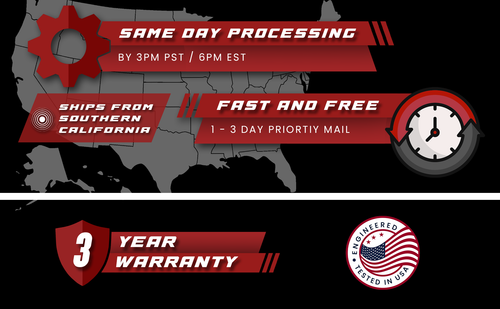Product Description
Test your BMW twin turbo the easy way & Get your boost back!
This Boost Leak Tester kit mounts inside both of the flexible intake hoses that lead to your turbo's compressor inlet flanges. You will need to remove the air box (or your aftermarket air filters) to expose the 2 intake pipes. Install the testers in each pipe and pressurize the system using the tire schrader with your tire inflation tool. The kit comes with the necessary caps to block the diverter valve return flanges on the intake pipes, also a cap to block the breather line at the bakc of the valve cover. Once the kit is installed, use compressed air to charge the system and you will see that both gauges read the compressor pressure you are filling with. You'll be able to test the turbo to the motor checking all leak points in between, including intercooler, clamped connections, intake manifold, divertor valves and the many random potential leak points.
Note: Testing at the intake pipe, you may hear noise coming from the o-ring (at ~12 psi test pressure) that seals the intake pipe to the turbo inlet from debris. This is not a boost leak, these are not meant to see boost and not intended to be perfectly sealed, however hearing this hissing may be mis-diagnosed as a leak. In this case reduce the pressure. If no obvious leaks are heard in any other location, the test is complete and there are no significant leaks
This is an important tool that every turbo car owner needs in their arsenal of tools. It is going to keep the turbo healthy by eliminating leaks in the boost path and not allowing it to over speed compensating for a boost leak. It is a must if you are tuned and or going to get a custom tune, or any time you are replacing any components in the intake tract such as charge hoses, intercooler, manifold, vacuum lines, injectors…etc. Also a must if you are going to the track and want the peace of mind that everything is tight and capable of handling sustained boost without blowing any hoses off
Why the Gauge?
Not having a gauge readout on a boost leak test is similar to filling air in your car's tire without a gauge. You just don't know how much air is in the system!
It is very wise to know how much pressure is actually going into the charge system to prevent damage to your engine and to yourself - Example if the compressor is unregulated (using high pressure shop air at 90 PSI) there is a risk that the charge pipes will be over-pressurized and something will give - the boost leak tester could blow off or any component of the engine could.
The gauge on the boost leak tester allows the user to:
- apply a safe amount of pressure to prevent injury or damage to the charge pipes or engine
- read how fast the system holds and bleeds air after removing the air source
- give a good comparison of compressor outlet air Vs. boost test air while pressurizing. The smaller the difference the lesser the air loss in the system
Design Features:
- Aluminum End Caps with 1/8" NPT threaded gauge port & fitting port
- Boost Gauges with 30 PSI / 2 Bar Boost Gauge
- Universal Tire Schrader Valve
- (2) Stainless Steel T-Bolt Clamps with Teflon lock-nut
- (3) Viny Caps for diverter valve return and valve cover breather
Application:
- 2007-2010 BMW 135i
- 2011 BMW 1-series M-Coupe
- Chassis: E82 E88
- N54 3.0L Twin Turbo





















